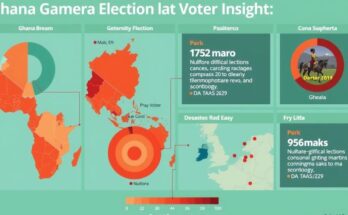The toy industry may encounter substantial price increases due to potential new tariffs proposed by President-elect Trump. With 80% of toys sold in the U.S. manufactured in China, retailers express deep concern for their viability and consumer affordability. The National Retail Federation warns of substantial economic losses in consumer spending if tariffs are implemented, while the Toy Association advocates for measures to address potential impacts on the industry.
The potential for increased toy prices looms as President-elect Donald Trump signals his intent to impose new tariffs on imports post-inauguration. A significant portion of toys sold in the United States—about 80%—is manufactured in China, making the toy industry highly vulnerable to any tariffs Trump may impose. Jennifer Bergman, owner of West Side Kids in New York City, indicates that a 10% tariff would likely cause immediate price increases, with 90% of her inventory sourced from China. Toy retailers express concern over customer effects and shop viability as the industry warns that higher costs may be passed onto consumers.
According to the National Retail Federation, if Trump proceeds with his tariff strategy, consumers could lose as much as $78 billion in spending power annually across various sectors, including toys and household goods. The Toy Association has described the potential tariffs as “significantly harmful,” urging industry stakeholders to petition their Congressional representatives regarding the matter.
Economists have noted that tariffs function as a tax on imports, directly affecting consumers through heightened prices. The Peterson Institute for International Economics remarked that a potential 60% tariff on China would severely disrupt international markets. The toy sector stands to be one of the hardest-hit industries due to China’s predominant role in toy manufacturing, particularly concerning compliance with U.S. safety standards.
While some speculate that Trump’s tariff threats may serve more as negotiating leverage, the prospect of incentivizing domestic manufacturing remains a plausible outcome, albeit one that would require time to achieve meaningful production capacity.
The discussion surrounding potential tariffs from President-elect Donald Trump primarily focuses on the implications for various industries, especially the toy sector. The toy industry is particularly impacted due to its heavy reliance on Chinese manufacturing. The apprehension expressed by toy retailers and industry associations revolves around the threat of increased prices for consumers, which may lead to diminished purchasing power and overall economic strain on those in the industry. The unique production capabilities of China also complicate any prospects for rapid transition to U.S. manufacturing, necessitating a closer examination of trade policies and their long-term impacts.
In summary, if President Trump follows through with proposed tariffs on imports, the toy industry could face significant challenges, including immediate price increases that threaten the survival of retailers and reduce consumer purchasing power. Stakeholders are urged to engage with their Congressional representatives to mitigate the effects of these tariffs. While the prospect of domestic manufacturing may bring some benefits in the long run, the immediate consequences for both consumers and retailers warrant serious consideration and action.
Original Source: www.cbsnews.com




